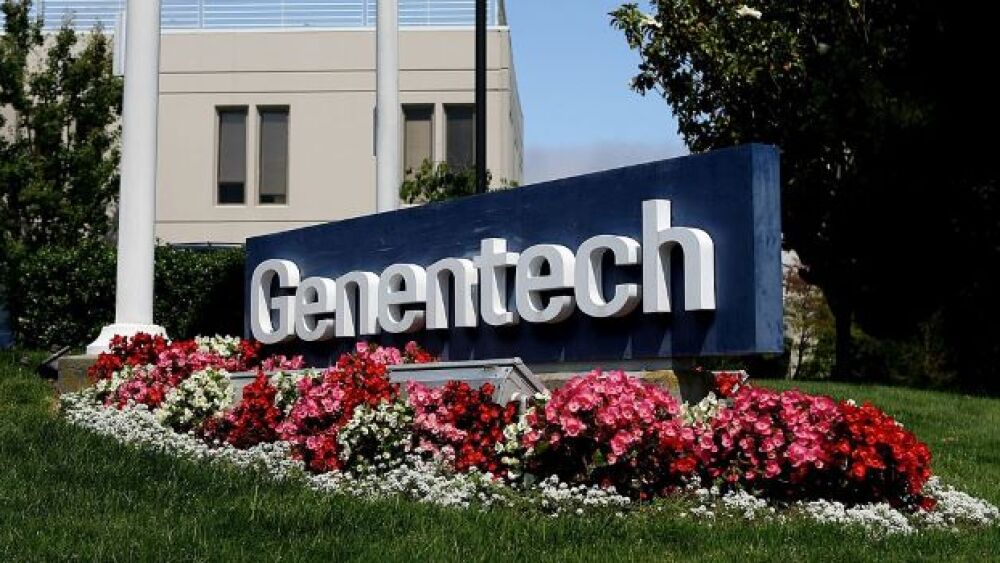As the FDA cracks down on accelerated approvals, Genentech, a Roche company, voluntarily withdrew its monoclonal antibody, Tecentriq, for metastatic bladder cancer.
Justin Sullivan/Getty Images
As the FDA cracks down on accelerated approvals, Genentech, a Roche company, voluntarily withdrew its monoclonal antibody Tecentriq (atezolizumab) for a specific type of previously-untreated metastatic bladder cancer.
The company indicated the anti-cancer therapy failed a postmarketing study required by the FDA.
“We are disappointed with this withdrawal, we understand the need to uphold the principles of the FDA’s Accelerated Approval Program,’ which brings innovative medicines to patients sooner,” said Levi Garraway, M.D., Ph.D., CMO and head of global product development for Genentech, in a press release.
Tecentriq is an anti-PD-L1 checkpoint inhibitor. Following this withdrawal, adults with locally-advanced or metastatic urothelial carcinoma who are not eligible for cisplatin-containing chemotherapy will no longer have access to the therapy inside the United States.
Company representatives emphasized that the decision doesn’t affect other Tecentriq indications in the U.S.
Researchers designed the postmarketing study to evaluate Tecentriq in combination with platinum-based chemotherapy as a first-line treatment for patients with advanced bladder cancer.
The FDA previously approved this indication under its accelerated approval program based on Tecentriq’s overall response rate and duration of response in the Phase II IMvigor210 trial.
In a 2020 analysis, the study failed to hit the treatment group’s co-primary endpoint of overall survival.
Then, in 2021, Tecentriq brought in $3.63 billion in sales. In the first half of 2022, Genentech reported $1.92 billion in sales.
The drug is also approved for non-small cell lung cancer, small cell lung cancer, other types of bladder cancer, a form of triple-negative breast cancer and liver cancer.
Late last year, Genentech voluntarily withdrew the U.S. indication for Tecentriq in metastatic urothelial carcinoma in patients previously treated with platinum-based chemotherapy.
The drug received accelerated approval for this indication in 2016, built on data from a cohort in the IMvigor210 trial. That study failed to hit the primary endpoint of OS in the PD-L1 high patient population.
After the failure of a previous Phase III trial in 2017, the FDA designated the IMvigor130 trial as the post-marketing study for the final analysis.
At the time, Genentech indicated it decided to withdraw Tecentriq for this indication despite the IMvigor130 trial continuing because of improvements in the treatment landscape in second-line mUC.
Accelerated Approvals Come Under Scrutiny
In June, the U.S. House of Representatives approved a bill, S4348, to give the FDA more power to force biopharma companies to run large, postmarketing studies.
The Senate Health, Education, Labor and Pensions Committee voted on S4348, as well. However, the Senate couldn’t reach a bipartisan deal on many of the provisions related to drug and device approvals. The original legislation expired in September.
A September report by the HHS Office of Inspector General found that of 278 accelerated approvals from 1992 to 2021, 104 had not completed confirmatory trials.
Seventy of those did occur in 2020 and 2021. The study found that 139 applications that had completed confirmatory studies took an average of 48 months to complete.
Of the 104 that were incomplete, 34% were past the initially planned completion date, averaging 20 months.
The report also found that since the inception of the accelerated approval pathway, 13% of all accelerated approval drug applications have been withdrawn. Half of those withdrawals have occurred since January 2021.
BioSpace has reached out to Genentech for comment.





